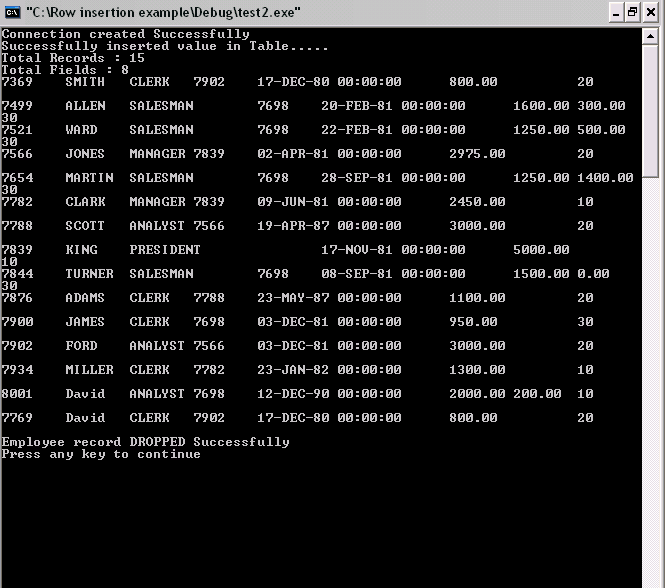 | Documentation |
|---|---|
29.6. Usage and ExampleTo build (i.e., compile and link) a program using libpq the user needs to do the following:
29.6.1. Example
#include "stdafx.h"
#include <libpq-fe.h>
#include <stdio.h>
#include <stdlib.h>
static void exit_nicely(PGconn *conn)
{ PQfinish(conn);
exit(1);
}
void main()
{ const char *conninfo;
PGconn *conn;
PGresult *res;
PGconn*conn1;
int i;
int j;
int nTuples;
int nFields;
//****setting the connection*******
conninfo = "hostaddr =10.90.1.66 port=5444 dbname=edb user=enterprisedb password= connect_timeout=5";
/* Make a connection to the database */
conn = PQconnectdb(conninfo);
/* Check to see that the backend connection was successfully made */
if (PQstatus(conn) != CONNECTION_OK)
{
fprintf(stderr, "Connection to database failed: %s",
PQerrorMessage(conn));
exit_nicely(conn);
}
printf("Connection created Successfully\n");
//***Executing Query//
// Table1 created
res = PQexec(conn,"INSERT INTO emp VALUES (7769,'David','CLERK',7902,'17-DEC-80',800,NULL,20);");
if (PQresultStatus(res) != PGRES_COMMAND_OK)//checking for error
{
fprintf(stderr, "Insertion Failed: %s", PQerrorMessage(conn));
PQclear(res);
exit_nicely(conn);
}
else
printf("Successfully inserted value in Table..... \n");
// Checking the values in Test table
res = PQexec(conn,"SELECT * FROM emp");//executing query
if (PQresultStatus(res) != PGRES_TUPLES_OK)//checking for error
{
fprintf(stderr, "FETCH ALL failed: %s", PQerrorMessage(conn));
PQclear(res);
exit_nicely(conn);
}
nFields = PQnfields(res);//getting number of fields
nTuples = PQntuples(res);//getting number of tuples returned
printf("Total Records : %d \n",nTuples);
printf("Total Fields : %d \n",nFields);
/* next, print out the rows */
for (i = 0; i < nTuples; i++)
{
for (j = 0; j < nFields; j++)
printf("%s\t",PQgetvalue(res, i, j));
printf("\n");
}
// drop table
res = PQexec(conn,"DELETE FROM emp WHERE empno=7769");
if (PQresultStatus(res) != PGRES_COMMAND_OK)
{
fprintf(stderr, "Employee record drop Failed: %s", PQerrorMessage(conn));
PQclear(res);
exit_nicely(conn);
}
printf("Employee record DROPPED Successfully\n");
/* close the connection to the database and cleanup */
PQfinish(conn);
} |
